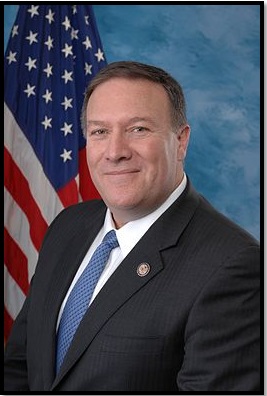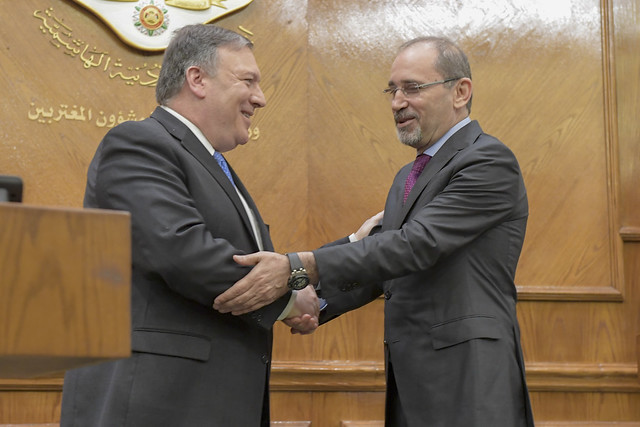 On April 26, Mike Pompeo embarked on his first international trip as Secretary of State. His first stop was Brussels, where he discussed the Iran nuclear deal with NATO allies. Trump has demanded fixes to the JCPOA under threat of withdrawing from it; he is due to make a decision on May 12. “There’s been no decision made,” Pompeo told reporters. “Absent a substantial fix, absent overcoming the shortcomings, the flaws of the deal, he [President Donald Trump] is unlikely to stay in that deal past this May.”
On April 26, Mike Pompeo embarked on his first international trip as Secretary of State. His first stop was Brussels, where he discussed the Iran nuclear deal with NATO allies. Trump has demanded fixes to the JCPOA under threat of withdrawing from it; he is due to make a decision on May 12. “There’s been no decision made,” Pompeo told reporters. “Absent a substantial fix, absent overcoming the shortcomings, the flaws of the deal, he [President Donald Trump] is unlikely to stay in that deal past this May.”
Pompeo continued to the Middle East, visiting key partners Saudi Arabia, Israel and Jordan. He argued that the nuclear deal does not provide permanent assurances that Tehran will never get a nuclear weapon. Pompeo also accused Iran of destabilizing the region by supporting proxy militias and terrorist groups. “Iran has only behaved worse since the deal was approved,” he said in Riyadh. The following are excerpted remarks from his trip.
In Brussels
“With respect to the JCPOA, we talked about it some today. I’m confident that that’ll be a topic on my trip throughout the Middle East as well, not only talking about the concerns that President Trump has expressed consistently, but talking about ways to potentially address those shortcomings, finding a potential solution to the very flaws that President Trump has identified for a long time now.
You asked if we talked about the decision. There’s been no decision made. So the team is working, and I’m sure we’ll have lots of conversations to deliver what the President has made clear. Absent a substantial fix, absent overcoming the shortcomings, the flaws of the deal, he is unlikely to stay in that deal past this May.”
―April 27, 2018, to the press at NATO Headquarters
In Saudi Arabia
Watch Secretary of State Mike Pompeo's full remarks with Saudi Foreign Minister @AdelAljubeir in #Riyadh, Saudi Arabia. pic.twitter.com/zXKQk1Bhon
— Department of State (@StateDept) April 29, 2018
Secretary of State Pompeo
“Adel and I covered a lot of ground during our meeting. We discussed Iran, Syria, Yemen, and Gulf relations. The foreign minister knows that Saudi Arabia’s security is a priority for the United States of America. We’ll continue to work closely with our Saudi partners to counter threats to this country’s security.
That, of course, starts with Iran. Iran destabilizes this entire region. It supports proxy militias and terrorist groups. It arms – it is an arms dealer to the Houthi rebels in Yemen, and Iran conducts cyber hacking campaigns. It supports the murderous Assad regime as well. Unlike the prior administration, we will not neglect the vast scope of Iran’s terrorism. It is indeed the greatest sponsor of terrorism in the world, and we are determined to make sure it never possesses a nuclear weapon. The Iran deal in its current form does not provide that assurance. We will continue to work with our European allies to fix that deal, but if a deal cannot be reached, the President has said that he will leave that deal.
I also want to highlight today that the nuclear deal has failed to moderate the regime’s conduct in many other areas. I highlighted a few. In fact, Iran has only behaved worse since the deal was approved. In Yemen, Iran continues to support the violent Houthi rebels by providing military equipment, funding, and training. This is in violation of the UN Security Council resolutions. The Houthis continue to fire
missiles into Saudi Arabia on a regular basis, targeting Red Sea shipping and threatening the Saudi people.”
― April 29, 2018, in remarks with Saudi Foreign Minister Adel al Jubeir
Foreign Minister Adel al Jubeir
“The challenges in the region have been reviewed, whether in Lebanon, in Syria, supporting Iraq, Iran’s negative interferences in the region, the situation in Yemen, supporting the five countries on the African Coast, and dealing with the crisis in Libya.
Our viewpoints were identical. There was a strong desire to intensify the work and mutual efforts in dealing with all these efforts. Regarding Iran, as we mentioned in the past, the Kingdom of Saudi Arabia supports President Trump’s policy towards Iran, and the Kingdom of Saudi Arabia supports the efforts to enhance Iran’s Nuclear Deal. We think the period to limit the enrichment of Uranium must be eliminated and eternal. Also, we believe monitoring Iran’s nuclear sites must be intensified. On the Iranian crisis, we also believe there should be more sanctions on Iran --for violating international resolutions regarding ballistic missiles and for supporting terrorism and intervening in the affairs of the courtiers of the region. In this regard, the U.S. and Saudi Arabia have identical viewpoints. And so is the case in all other topics.”
― April 29, 2018, in remarks with Secretary of State Pompeo
In Israel
Secretary of State Pompeo
“Many of our conversations today, Mr. Prime Minister, as you said, centered on Iran. Strong cooperation with close allies like you is critical to our efforts to counter Iran’s destabilizing and malign activity throughout the Middle East and indeed throughout the world. We remain deeply concerned about Iran’s dangerous escalation of threats to Israel and the region, and Iran’s ambition to dominate the Middle East remains. The United States is with Israel in this fight and we strongly support Israel’s sovereign right to defend itself.
Regarding the JCPOA, President Trump’s been pretty clear. This deal is very flawed. He’s directed the administration to try and fix it, and if we can’t fix it, he’s going to withdraw from the deal. It’s pretty straightforward. Unlike the past administration, President Trump has a comprehensive Iran strategy that is designed to counter the full array of threats emanating from Tehran.
As part of the President’s comprehensive Iran strategy, we are also working to counter the broad set of non-nuclear threats: Iran’s missile systems, its support for Hizballah, the importation of thousands of proxy fighters into Syria, and its assistance to the Houthi rebels in Yemen. We look forward to working closely with strong allies like Israel in countering these threats and rolling back the full range of Iranian malign influence.
Regarding Syria, where the barbaric Assad regime is propped up by Iran, the United States’ top priorities are to defeat ISIS, de-escalate violence, deter the use of chemical weapons, and ensure the safe delivery of humanitarian aid and support an ultimate political resolution to the conflict. Our strategy to do that
remains unchanged. We strongly support the UN-led efforts in Geneva to bring an end to the Syrian conflict, which has gone on for far too long.”
― April 29, 2018, in remarks after a meeting with Israeli Prime Minister Benjamin Netanyahu
Prime Minister Benjamin Netanyahu
“Mr. Secretary, I think the greatest threat to the world and to our two countries and to all countries is the marriage of militant Islam with nuclear weapons, and specifically, the attempt of Iran to acquire nuclear weapons. We’ve had a very productive talk today on this subject as well. I appreciate the President’s leadership and your position on stopping Iran from ever acquiring nuclear weapons. I appreciate the President’s and your position on stopping Iran’s aggression in the region. That aggression has grown many-fold since the signing of the Iranian deal. If people thought that Iran’s aggression would be moderated as a result of signing the deal, the opposite has happened, and Iran is trying to gobble up one country after the other. Iran must be stopped. Its quest for nuclear bombs must be stopped. Its aggression must be stopped. And we’re committed to stopping it together.”
― April 29, 2018, in remarks after a meeting with Secretary of State Pompeo
In Jordan
Secretary of State Pompeo
“[B]oth of our countries know the threat that Iran poses to the region. This morning we had a chance to discuss how best to counter Iran’s malign influence and activity in the region, and with all of our allies we’ve had discussions with respect to the JCPOA.”
—April 30, 2018, to the press in Amman

